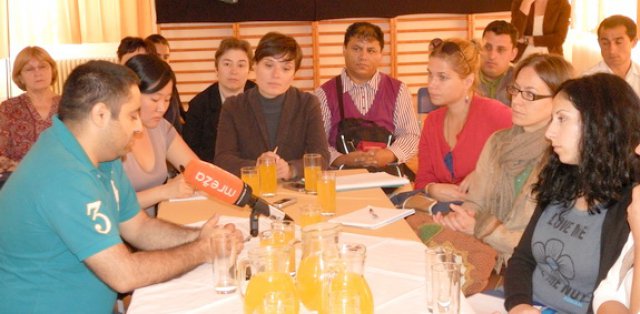NGOs Visit Croatia to Find Successful Practices on Roma Education and Desegregation
02 October 2013
 The “Desegregation and Action for Roma in Education” (DARE) Network gathered for a two-day exchange visit in Croatia to visit various locations where desegregation projects are taking place, and to discuss successful practices on school desegregation and access to quality education for Romani children.
The “Desegregation and Action for Roma in Education” (DARE) Network gathered for a two-day exchange visit in Croatia to visit various locations where desegregation projects are taking place, and to discuss successful practices on school desegregation and access to quality education for Romani children.
The visit was organised by the European Roma Rights Centre (ERRC), a human rights organisation which was the legal representative of the applicants in the case of Orsus and Others v Croatia. This case litigated on behalf of Romani children before the European Court of Human Rights on the issue of school segregation. The visit looked at the development of the implementation of the judgment and shared successful practices of desegregation projects in Croatia with network member.
Network partners visited the primary school of Vladimira Vidrica in Kutina, where a successful desegregation project has been implemented to prevent the school turning into a segregated school. The project was launched by the local municipality, together with the school, which participated in the project ‘Improved access to quality education of Roma in Croatia’ implemented by Ministry of Education, Science and Sports and Budapest based NGO, the Roma Education Fund (REF). As well as school representatives, the partners also met with representatives of the local authorities, Roma representatives and teachers.
Participants also traveled to Medjimure County and visited local settlements in Trnovac where some of the applicants of the Orsus and Others v Croatia case live. The network members inquired about the implementation of the judgment and the schooling of the Romani children in the settlement.
At one kindergarten in Mursko Sredisce desegregation efforts have been implemented by the local municipality together with the Roma Education Fund (REF). Under the project, the enrolment of Romani children from the nearby settlement (Sitnice) is facilitated and Romani children are bused to the kindergarten.
After visiting the kindergarten, network members visited a Romani settlement in Podturen where they met with further applicants of the Orsus and others v Croatia case, and discussed with applicants the developments in the schooling of the Romani children living in the settlement.
The exchange visit in Croatia was attended by the DARE network members, the Chance For Children Foundation (CFCF) from Hungary and local expert of the Roma Education Fund (REF).
The members of DARE-Net are: Integro Association (Bulgaria), Life together Association (Czech Republic), ANTIGONE (Greece), European Roma Rights Centre (Hungary), Romani CRISS (Romania), as well as FXB Centre for Health and Human Rights at Harvard University. The DARE-Net project succeeded to create a trans-national network of Roma and non-Roma civil society and academic organisations to analyse practices and initiatives relating to Roma education and school desegregation of Roma children in Romania, Croatia, Greece, Hungary, the Czech Republic and Bulgaria.
More information on the project is available here.
The DARE-Net project is financially supported by Lifelong Learning Programme – European Commission
For further information, please contact:
Sinan Gökçen
Media and Communications Officer
European Roma Rights Centre
Tel. +36.30.500.1324
sinan.gokcen@errc.org




